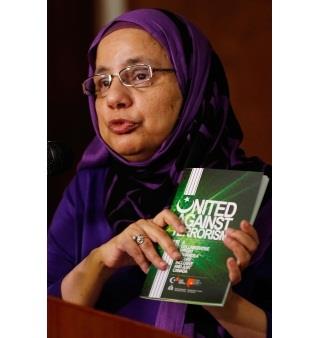Canadian Muslims Published Handbook to Keep Youth from Extremism

The city’s Islamic Social Services Association (ISSA), in conjunction with national Muslim organizations, unveiled the booklet on Monday afternoon.
ISSA president Shahina Siddiqui said the booklet is the first step in what will be a multi-pronged, national strategy aimed at preventing youth from joining terror groups.
“We do not see this phenomenon of terrorism as only a policing issue,” Siddiqui told reporters during a news conference. “We see it as a social issue, we see it as a community issue, and we see it as a media issue.”
The booklet has five sections, including a chapter devoted to challenging extremist messages of violence through the Quran and the teachings of the Prophet Muhammad [PBUH]. It also includes advice for parents on the red flags to watch for that suggest their child may be following extremist teachings.
The idea for the booklet was born from a town hall meeting at Winnipeg’s Grand Mosque in June 2013. The objective was to share ideas and identify information gaps in order to come up with a plan “and reverse this trend whereby Canadian youth are getting recruited by these criminal gangs, by these terrorist groups overseas.”
The issue of Canadian youth becoming radicalized and joining terror groups overseas, such as al Qaeda or ISIL, has become more prominent in recent years.
Late last month, the federal government said it was aware of more than 130 people with “Canadian connections” who had travelled abroad and were suspected of engaging in terror-related activity over the past year.
Ihsaan Gardee, executive director of the National Council of Canadian Muslims, said the handbook is a guide for parents, teachers, community leaders and others to “better understand the phenomenon of radicalization toward criminal violence … and how to best address it.”
Research shows that there is no one single trajectory that leads a youth to endorse or engage in violence, Gardee told CTV News Channel.
But there are three steps that can help ensure that “the message of violent extremism does not find traction here,” he said.
*Ensuring that Canadian Muslims understand their rights in Canada and their responsibilities as “active and engaged citizens”
*Creating safe spaces where people of all ages -- including youth who feel disenfranchised and alienated due to images of war from their ancestral homeland or Islamophobia in their communities -- can air their grievances in a safe and comfortable forum.
*Challenging stereotypes that make Islam and violent extremism interchangeable, particularly in the media, which extremists use to tell youth that they will never be accepted.
The booklet will be followed by new strategies aimed at prevention and intervention. Prevention measures will include educating both Muslims and non-Muslims to help counter the Islamophobia that “plays a big role in making youth vulnerable” to extremist campaigns, Siddiqui said.
A roundtable of experts will convene in Winnipeg in November to develop a strategy for addressing extremist messaging and coming up with a “made in Canada” strategy for “deconstructing their narrative.”
Source: CTVNews



